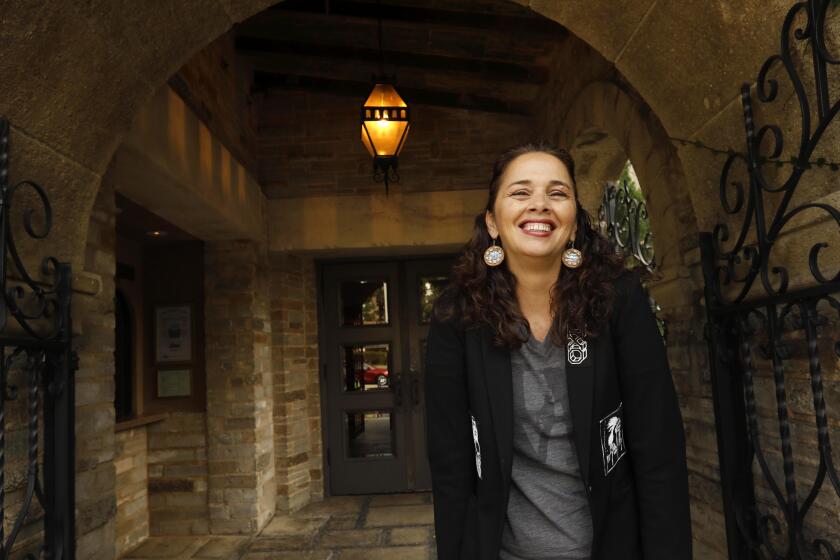‘A Separation’ has a powerful effect on L.A. Iranians
For all the pride the Iranian film “A Separation” has conjured among Los Angeles Persians, not every aspect of the emotionally gripping Oscar hopeful has gone over so smoothly with the city’s expats. In fact, it takes just moments for the filmmaker to alienate some of his most ardent fans here.
In the opening scene, a husband and wife stare straight into the camera, presumably into the eyes of a judge, as the woman explains why she’s asking for a divorce: Her husband, she pleads, refuses to flee Iran with her because he feels obligated to stay and care for his ailing father.
“I can’t abandon him,” the man says.
“His father has Alzheimer’s,” the woman responds. “He doesn’t even know that’s his son. What difference does it make to him?”
As the woman tries to argue they need to leave the troubled nation for their daughter’s sake, the judge sides solidly with her husband: “You mean to say that children living in this country don’t have a future?”
In a country that has seen thousands flee during the last several decades, the opening exchange appeared to some a concession to regime officials who could have halted the film’s release. But for some 90,000 Iranian expatriates around Los Angeles, all of whom did decide to flee, the argument that abandoning Iran might have been irresponsible rings hollow.
“I had sympathy for the wife, she’s trying to do something good for the kid and the judge turns around and says, ‘What’s wrong with our country?’” said Siamak Kalhor, a popular Iranian radio host on KIRN-AM (670). “That’s something that if the filmmaker had not put in, the movie wouldn’t have gotten out…. We have to be naive if we think filmmakers have all the freedom — they can’t make any political statements that Iran isn’t a good place to live.”
But what filmmaker Asghar Farhadi’s story may have lacked in overt political criticism, it made up for with nuanced human storytelling, many in the Iranian community here say. As the couple at the center of the film bicker over whether to flee the country, and whether to divorce, the husband — Nader, played by Peyman Moadi — struggles to care for his Alzheimer’s-ridden father. When he discovers one afternoon that his father’s nurse, played by Sareh Bayat, left the old man tied to a bed for the day, Nader reacts violently. He pushes the nurse out of his home, only to discover later that her fall may have caused the pregnant woman to miscarry.
Suddenly, he’s facing murder charges, and a bitter dispute with the nurse’s erratic, long-unemployed husband, played by Shahab Hosseini.
By American standards, what follows is remarkable. A magistrate sits the two couples down in a room the size of a walk-in closet, where he serves as judge and prosecutor. Many Iranian Americans in L.A. — home to the largest Persian émigré community outside of Iran — say the shockingly casual setup for the criminal hearing was actually flattering compared with typical Iranian judicial proceedings.
“Most of the people, we see this film and thank God that we are here and we are not there,” said Bijan Khalili, owner of the Ketab Persian Bookstore in Westwood. “We see we have a better life here.”
Kalhor said the film’s trial scenes reminded him of the experience of his own father, who was arrested for illegally transferring money to the U.S. for a medical procedure for his daughter. His father’s trial, Kalhor said, lasted less than an hour and resulted in six months in prison.
The radio host, who saw the film twice, said the filmmaker’s rich depiction of life in Iran may have not have made for overt political criticism, but was powerful nonetheless simply by exposing the crude machinery of civil life there. Many of the pressures on the protagonists, he said, could also be blamed on Iran’s rigid religious customs. “This movie was really clever,” he said. “Farhadi got away with a lot of clever stuff even the smartest [censors] couldn’t catch.”
But not all of the film’s expat fans found social criticism in the story. Bita Milanian, who heads the nonprofit Farhang Foundation, which celebrates Iranian art, said the film was simply a human tale that anyone — whether from a repressive homeland or not — could relate to.
Iranian Americans, she said, too often look for underlying social critique where there isn’t any. She believes that inclination is a reaction to the steady stream of negative attention to Iran over the years — whether during the American embassy hostage crisis of the 1980s, the brutal crackdown on dissidents during the so-called Green Movement or the deepening tensions currently brewing between Iran and the West.
“Because of all these negative notions about Iranians in the news and the media — and everybody seeing us in affiliation with the government there — we’re always trying to defend ourselves and separate ourselves,” she said. “So anything [like this film] that puts us in the media we’re hoping has a good message, we hope it’ll validate us.”
The dueling perspectives on the film, within the same tightknit Los Angeles community, might have been exactly what the film’s creator was striving for. “I don’t think it’s important for the audience to know my intention,” Farhadi has said. “I’d rather they left the cinema with questions.... From the opening scene, I aimed to set this up. The film’s first question is whether an Iranian child has a better future in his or her own country or abroad. There is no set answer.”
Either way, the film has proved extremely successful with the local expat community. As with many of the Iranian films distributed here, moviegoers have left theaters in tears — sometimes just because of the nostalgia for home the images evoke among those who never expected to raise their children abroad.
“A Separation” is nominated in two Oscar categories: original screenplay, by Farhadi, and foreign film.
Farhadi is one of several Iranian filmmakers, along with directors such as Abbas Kiarostami and Majid Majidi, to gain prominence in recent years. Though Iranian cinema can be slow-moving and draining, it has developed an enthusiastic audience in the U.S. and abroad. The only other Iranian work ever nominated for best foreign film — 1997’s “Children of Heaven,” about two young siblings sharing one pair of shoes — was edged out by Italy’s “Life Is Beautiful.”
Khalili said the Golden Globe awarded to “A Separation” last month has many here optimistic that an Iranian filmmaker might be taking home Oscar gold for the very first time.
“If it wins,” Khalili said, “we think we win.”
More to Read
The biggest entertainment stories
Get our big stories about Hollywood, film, television, music, arts, culture and more right in your inbox as soon as they publish.
You may occasionally receive promotional content from the Los Angeles Times.







